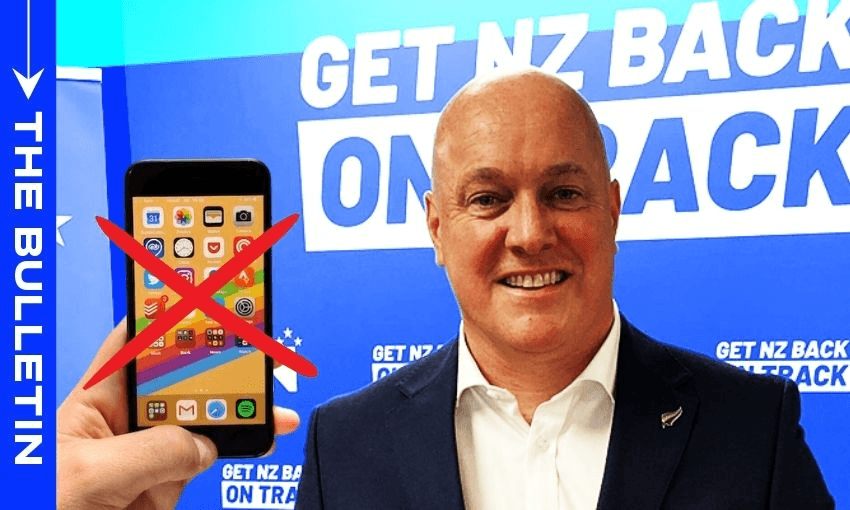It’s happening across the world and is backed by a recent UN report and plenty of academics. But is it an old-world solution to a new-world problem and what might younger people think, asks Anna Rawhiti-Connell in this excerpt from The Bulletin, The Spinoff’s morning news round-up. To receive The Bulletin in full each weekday, sign up here.
Phones to be banned at primary, intermediate and secondary schools
The National party announced this morning that it will introduce a ban on phones in schools. Leader Christopher Luxon said National wanted to “turn around falling achievement” by eliminating “unnecessary disturbances and distractions”. Phones would be banned at schools for the entire day at primary, intermediate and secondary schools. Schools will be able to decide how they enforce it and there will be exceptions for students with health conditions or special circumstances. Responding to a tease of the policy yesterday, education minister Jan Tinetti said that introducing a Government-ordered national ban is unnecessary, and shows a lack of understanding of how schools operate in New Zealand.
Phone bans increasingly embraced around the world
A recent report, published in late July by Unesco said smartphones should be banned in schools to tackle classroom disruption, improve learning and help protect children from cyberbullying. Based on Unesco’s analysis of 200 education systems around the world, it estimated one in four countries had banned smartphones in school, either through law or guidance. National’s proposal follows a ban on phones in schools in multiple states in Australia, the most recent being in New South Wales (NSW). There was some objection to the introduction of the policy in New South Wales with parents concerned about not being able to contact their kids in an emergency. Closer to home, the University of Auckland’s Dr Samantha Marsh spoke to Newshub Nation in late July calling for social media to be treated like any other addictive substance pointing to new research that shows screen-based activities are structurally changing our kids’ brains – and not in a good way. Marsh said the first thing New Zealand should do is ban phones in schools.
The counter-arguments
It’s also worth considering some of the counter-arguments to banning phones in schools, the efficacy of leaving enforcement to schools as mooted by National and whether young people should perhaps be involved in the design of these kinds of bans rather than having them enforced from the top down. In Ontario, the question of enforcement is raised frequently and debate still rages among educators about the merits of the ban. One educator described it as a “1960s solution to a 2023 problem”. Writing on phone bans in Australia, Joanne Orlando, a researcher in digital literacy and digital wellbeing at Western Sydney University, observes that in statements from Australian education minister Jason Clare, students were left off the list of those who would be spoken to about a national approach to phone bans. Orlando has also summarised some of the research on whether phone bans result in improved learning outcomes or a decrease in bullying. A collection of studies suggests they don’t. As with research into the impact of social media on young people’s mental health, it’s a tricky area.
What do actual young people think?
The group most likely to object to the ban, school students themselves, are not able to vote, so unless parents reject the idea, it’s likely to be a vote winner for the party. While Orlando points to plenty of videos on TikTok of students busting their phones out of the pouches schools use to lock them away for the day, we also shouldn’t be too quick to assume that young people have unsophisticated views of their relationships with phones. Dear to my heart, as someone who wants to throw her phone into the ocean most days, is Logan Lane. Lane started the “Luddite Club” in Brooklyn, New York and talks about it in this New York Times podcast (gift link). As this article from The Conversation notes, there is a growing movement among Gen Z to embrace “dumb phones”. These teenagers, spoken to in Ottawa following the ban on phones in schools in the Canadian province of Ontario in 2019, express very measured views about their smartphone use. I guess what I’m saying is that while we will no doubt hear from politicians, educators and parents today, to quote Maude Flanders entirely out of context, “Won’t someone think of the children!”


